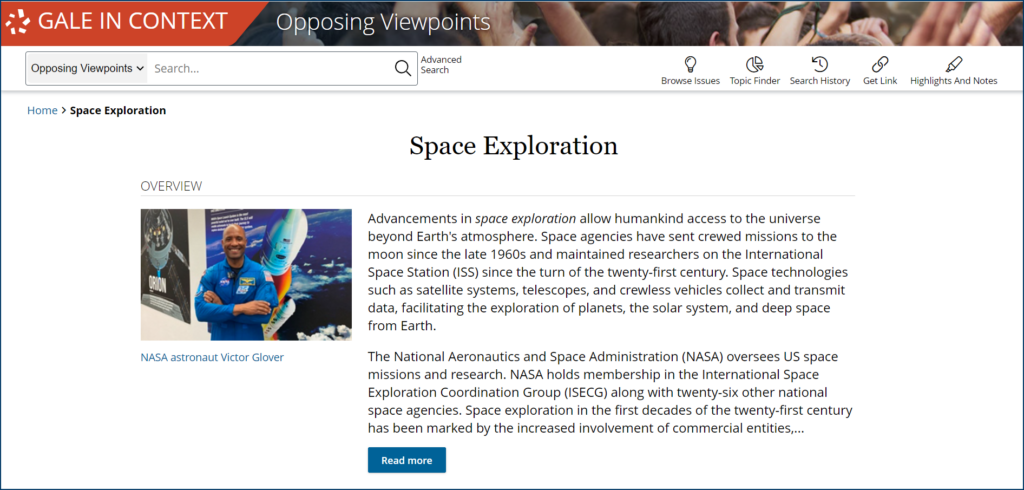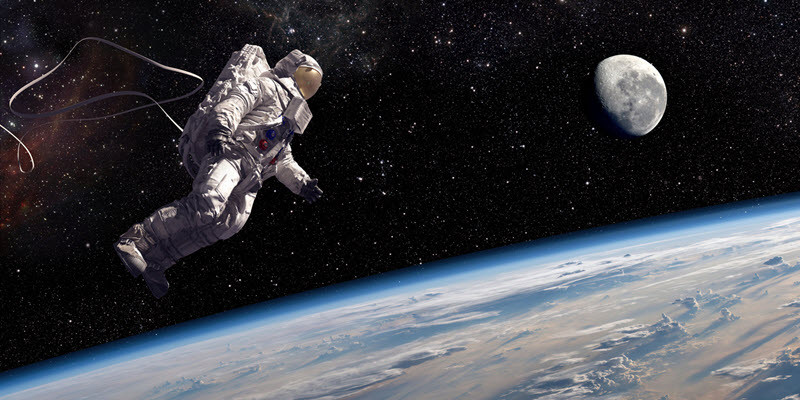Space exploration is inherently fascinating, rich with stories of triumph, such as the 1969 Moon landing—but also rife with perils and tragedies, such as the 1986 Challenger explosion. In recent years, the advent of space tourism has underscored issues including cost, access, and equitable resource use amid rising global political tensions.
As we have explored just a tiny fraction of outer space, what remains is unpredictable and inspires endless questions. The topic is undeniably engaging for the high school classroom, but it’s also intriguing to present its nuance and controversy. You can rely on Gale In Context: Opposing Viewpoints to introduce more than 20,000 different perspectives around complicated issues like space travel.
Journeys to space often place people’s lives at risk, and spaceflight can have adverse effects on astronauts, including DNA damage, muscle and bone loss, and vision impairment. Critics have also raised concerns about human and religious rights. For example, since NASA is a federally-funded program, publicized religious readings from the 1968 Apollo 8 crew led to legal controversy about the separation of church and state that reached the Supreme Court.
To develop a space-based lesson plan, Gale In Context: Opposing Viewpoints features extensive and diverse research materials applicable to K-12 learners. The database lends itself to engaging classroom debates and thoughtful reflection. Users can even find embedded critical thinking questions and poignant commentaries to help challenge assumptions and develop informed opinions about the world (and universe) around us. Use our dedicated space exploration collection to dive into some of the major academic arguments surrounding the science.

Consider the Financial Burden
Social critics argue that space exploration is too expensive and the investment has little immediate practical benefit. In general, much of the science is experimental, and millions of dollars in R&D ends in failure each year. A 2022 article from the Economist calls a recent NASA endeavor “a financial black hole,” and the current Artemis missions are already billions over the projected budget.
The FY25 federal budget request for NASA totals more than $25 billion—greater than the budget to support the country’s nutrition programs and address homelessness combined. Joel Berg, CEO of Hunger Free America, estimates that $25 billion could end food insecurity in the United States. Critics argue that spending so much on space-based research is irresponsible in light of deeply underfunded human services programs.
Yet, humanity has much to gain through its investment in space. An article from the Globe & Mail suggests that space exploration has led to significant innovations, including robot-assisted surgeries, heart pumps, and water filtration systems. Moreover, NASA satellites provide vital data about climate change. The program creates jobs, boosts the economy, and invigorates our shared sense of wonder. And, compared to the federal government’s overall spending allocations, the NASA budget is just a drop in the bucket.
Activity Idea: Without NASA, we wouldn’t have cordless tools, memory foam mattresses, or even certain cancer detection technologies. Using Gale In Context: Opposing Viewpoints, have students research other valuable inventions and ideas that stem from space-based research.
Weigh Space Travel’s Impact on the Environment
Space travel releases pollution and waste. Space debris, including pieces of rockets and defunct satellites, litter the Earth’s atmosphere. Rockets release dangerous chemicals and CO2 emissions, further damaging the ozone layer. One passenger on a rocket creates 100 times more pollution than that same person on an airplane—and that damage will only increase with the advent of space tourism.
Conversely, NASA researchers are at the forefront of climate change. NASA satellites have been pivotal in measuring the rise of global sea levels and temperatures, providing indisputable data on climate change. NASA engineers are also responsible for energy efficiency improvements on Earth, including home insulation technologies, solar array cells, and better batteries. These practical applications help us cut down on energy use and greenhouse gas emissions. Through this lens, space exploration serves as a valuable asset against climate change with long-term benefits that could outweigh the immediate ecological risks.
Debate the Commodification of Space
The commercialization of space poses significant questions. Gale In Context: Opposing Viewpoints can assist in this rich classroom discussion by facilitating discussion topics and questions, such as the following:
- Only some nations have the assets for space travel, so how do we divide its benefits fairly?
- If one country were to build a colony in space, who would have the right to live there?
- Some experts believe the Moon and other celestial bodies could contain valuable resources (helium-3) for generating power. Who gets those mining rights?
- If we open the doors for space mining or colonization, are we destined to repeat the mistakes we’ve made on Earth?
At the same time, valuable resources from space could help wean humanity away from Earth’s limited resources. Experts estimate that a small portion of an asteroid could contain trillions of dollars of useful metals. NASA engineers could use resources harvested from space for propellants to extend missions and reduce dependence on and the cost of materials from Earth. Identifying and extracting extraterrestrial resources could prove a major advancement for human society.
Discussion Idea: Scientists (and many science fiction stories) have discussed the feasibility of colonizing the Moon and even other planets. If there were a colony in space, would students choose to live there? Why or why not?
Discuss the Potential for International Relations
Commodifying outer space is only part of the international conversation. Potential concerns around security and weaponization are far more troubling. China’s growing space program raises alarm bells for national security advisors who worry the Communist nation would set a tone of secrecy and mistrust for this fraught frontier. But it’s extremely complicated to dictate who and how we should govern outer space.
One could argue that friendly nations should lead the way to prevent international politics from expanding beyond Earth’s atmosphere. The International Space Station is a prime example of the potential for global collaboration and diplomatic advancements.
At home, a recent Pew Research Center poll found that most Americans believe the United States should be a leader in space exploration, and the topic inspires significant national pride. Plus, NASA helps monitor (and redirect) asteroids and other objects that could potentially collide with our planet. Investing in the U.S. space program shows support for protecting humanity worldwide.
Discussion Idea: Does international law extend to the extraterrestrial frontier? Do global treaties apply in space? Dive into Gale In Context: Opposing Viewpoints to find a range of perspectives and ask students to share what they think.
One thing is clear: space exploration is a rich topic that demands thoughtful, open-minded study and a balanced perspective. Gale In Context: Opposing Viewpoints can help your students avoid common research pitfalls like misinformation and bias. K-12 teachers can trust that our space exploration portal is up-to-date and vetted by our experts, fostering a learning environment that supports students in creating mature, educated opinions.
If your school district is not a current Gale subscriber, contact your local representative to discuss the next steps and request a product trial.


